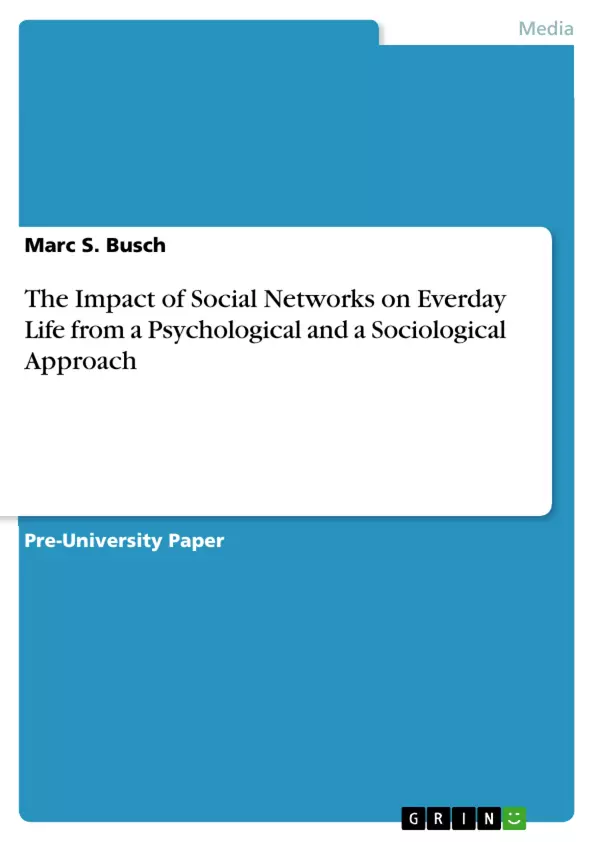'Social networking' lies within human nature and evolved over centuries – at all times synchronously to recent innovation. 'Social networking' is not a modern 'phenomenon'. To reduce it to simpler terms, 'social networking' means forming a society out of individuals.
An instantaneous paradigm shift – regarding our ways of communication – has already occurred. Checking new e-mails or social network updates developed into a casual, daily action, just like taking a short look at one's watch in former times.
'Facebook' and it's social media equivalents have had a massive impact on social life structures, especially within the examined age class of the under 18 year-old minors.
Inhaltsverzeichnis (Table of Contents)
- Introduction
- What is a 'social network'? - A short overview.
- Psychological approach
- Who are we? - Social networks and the individual.
- Sociological approach
- Who are our friends? - Social networks and friendship.
- How do we behave? - Social networks and interaction.
- Final conclusion
- To what extent does the digital revolution affect everyday life? Social networks and prospects.
Zielsetzung und Themenschwerpunkte (Objectives and Key Themes)
This paper explores the impact of social networks on individuals and society, focusing primarily on the experience of young adults. The research aims to understand how these platforms influence everyday life, interaction, and self-perception. Key themes investigated include:- The pervasive influence of social networks on communication and information sharing.
- The role of social networks in shaping identity and social interactions.
- The potential risks and benefits associated with social network use, including issues of privacy and control.
- The economic implications of social networks and their impact on user behavior.
- The evolution of social networks and their ongoing impact on our understanding of community and connection.
Zusammenfassung der Kapitel (Chapter Summaries)
The introductory chapter explores the concept of 'social networking', tracing its evolution from ancient forms of human interaction to the modern digital era. It highlights the significance of the internet and mobile technology in transforming communication and creating new avenues for social connection. The chapter also examines the rise of Facebook and its impact on social structures, particularly among younger generations. The "Psychological approach" chapter delves into the individual experience of social network use, drawing upon data collected from a survey of individuals aged 17-19 and older adults. The chapter analyzes the frequency of social network usage, the reasons for joining these platforms, and their influence on individual identity and self-perception. It also explores the potential impact of social networks on mental health and well-being.Schlüsselwörter (Keywords)
This paper focuses on the impact of social networks, specifically Facebook, on individual and social life. It examines themes of communication, information sharing, identity, interaction, privacy, control, economics, and the evolution of social structures in the digital age. The study relies on survey data and interviews to explore these concepts in relation to a specific age group, offering insights into the contemporary experiences and perspectives of young adults.Frequently Asked Questions
How have social networks changed everyday communication?
Social networks have caused a paradigm shift. Actions like checking updates or emails have become casual, daily habits, much like looking at a watch in the past.
What is the psychological impact of social networks on minors?
For individuals under 18, platforms like Facebook significantly influence identity formation, social interaction, and self-perception.
Is social networking a modern phenomenon?
No, forming networks is part of human nature and has evolved over centuries. Modern technology has only changed the speed and scale of these interactions.
What are the main sociological concerns regarding digital social life?
Sociological approaches examine how friendships are defined online, how social structures change, and the impact of the digital revolution on community behavior.
How do social networks affect privacy and control?
The pervasive influence of these platforms raises significant issues regarding personal data privacy, user control, and the economic exploitation of user behavior.
- Quote paper
- Marc S. Busch (Author), 2011, The Impact of Social Networks on Everday Life from a Psychological and a Sociological Approach, Munich, GRIN Verlag, https://www.grin.com/document/264739



